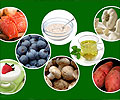
In tests with raw and cooked cloves, milk was shown to ' significantly reduce' concentrations of the chemicals that give garlic its long-lasting smell, reports the Daily Mail.
One of the compounds - allyl methyl sulphide (AMS) - cannot be broken down during digestion, causing it to be released from the body in the breath and sweat.
Food scientists at Ohio State University found that drinking a small glass (200ml) of milk can reduce the presence of AMS on the breath by 50 per cent.
The U.S. study, concluded that full-fat milk gave better results than skimmed and it was also better if diners drank with their meal, rather than afterwards.
The study has been published in the Journal of Food Science.
Advertisement












